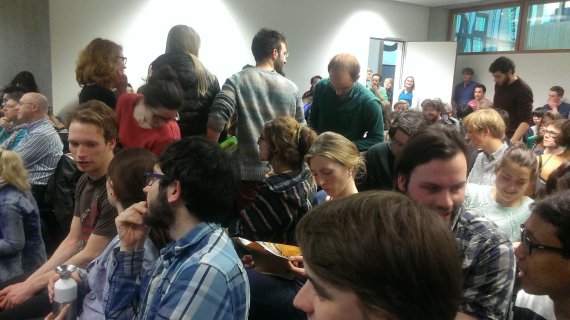Wageningen economist Justus Wesseler launched the debate about ‘GMOs for sustainable development’ in the Forum on 8 April by declaring that the distinction between genetically modified crops (GMOs) and conventionally bred crops is artificial. ‘A far more extensive risk analysis has now been done for GMOs than for conventional crops. You’d be better off basing the risk assessment on the effects of the characteristics introduced than on the technique itself.’ An hour and a half later, an organic plant breeder drew exactly the same conclusion. ‘Shouldn’t we start assessing GMOs on the basis of the aim and the need, using sustainability criteria?’
In the interim, Herman van Bekkem of Greenpeace had explained that the environmental organization is against all GMOs regardless of their purpose and use, and Peter Metz of Monsanto had explained that GMOs are one of the means of feeding more people with less land and water. This was the first time Monsanto has taken part in a discussion about GMOs. ‘We think there is too much polarization in the GMO discussion,’ said Metz, a former researcher at Wageningen UR who has been working for Monsanto in Wageningen since 1998. ‘We want to participate in a constructive dialogue.’ This was rewarded with generous applause for the three speakers from a full house of students.
We think there is too much polarization in the GMO discussion. We want to participate in a constructive dialogue.
Peter Metz, Monsanto
With reference to Monsanto’s GMO varieties, such as its herbicide-resistant maize variety, Van Bekkem explained that GMOs pollute the environment and put pressure on farmers. Two American crop farmers who wanted to go back to growing conventionally bred maize after 8 years of growing GM crops were prevented from doing so by a market monopoly and the high costs, claimed the Greenpeace campaigner. Wesseler conceded this point to Van Bekkem, but also pointed out that studies have shown that the large plant-breeding companies do not tend to abuse their dominant market position, as they price their seed competitively.
Shouldn’t we make a distinction, asked some members of the audience, between ‘bad’ GMOs, such as Monsanto’s herbicide-intolerant maize, and ‘good’ GMOs which reduce dependence on chemical pesticides and artificial fertilizer? Wesseler could list a few of these ‘climate-friendly GMOs’ such as grain varieties which are drought-resistant and GMOs which promote organic nitrogen fixation. Metz cited a Monsanto project on adapted rice in the Sahel. But Van Bekkem countered this by pointing out the socio-economic impact of current GMOs, such as the way Brazilian companies sow their vast GM monocultures from small planes, at the expense of both biodiversity and small farmers.
Discussion chair Bert Lotz of Wageningen UR put his oar in too, in an attempt to make sense of the GMO arguments. Was an environmentally friendly GMO created by a public organization without a patent, such as Wageningen UR’s cisgene apple, acceptable for the enemies of the Monsantos of this world? Interesting, responded Greenpeace, but there are already smart non-GMO breeding techniques with which you can achieve the same result. And Van Bekkem prefers those to the ‘new technology’ of genetic modification.
The evening was closed by the organizers of the debate, the RUW foundation and the youth branch of the green left party Groenlinks. They did not draw conclusions on the content of the evening but expressed their appreciation of the willingness of both Monsanto and Greenpeace to engage in a debate on sustainable GMOs. The big turnout and enthusiastic applause implied a hunger for more. An audience of about 60 was expected, and 200 people showed up.

